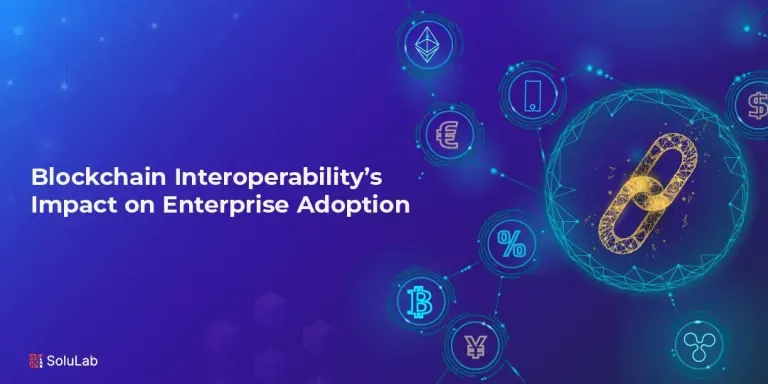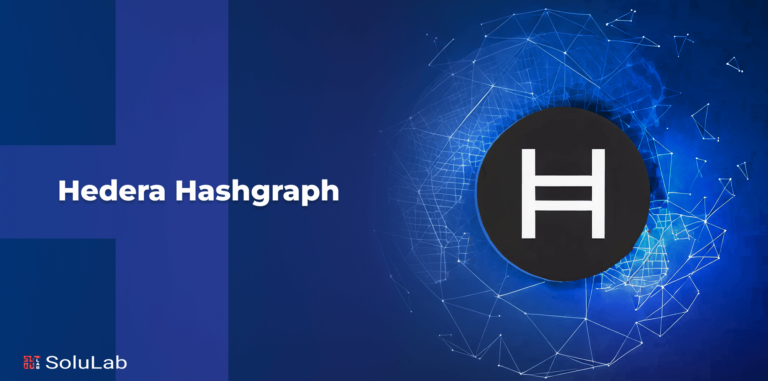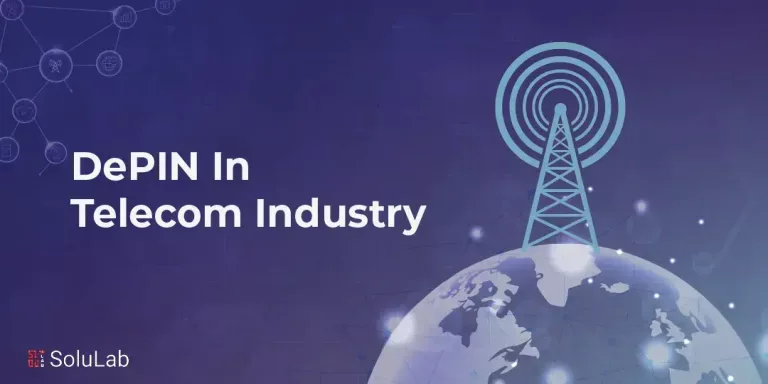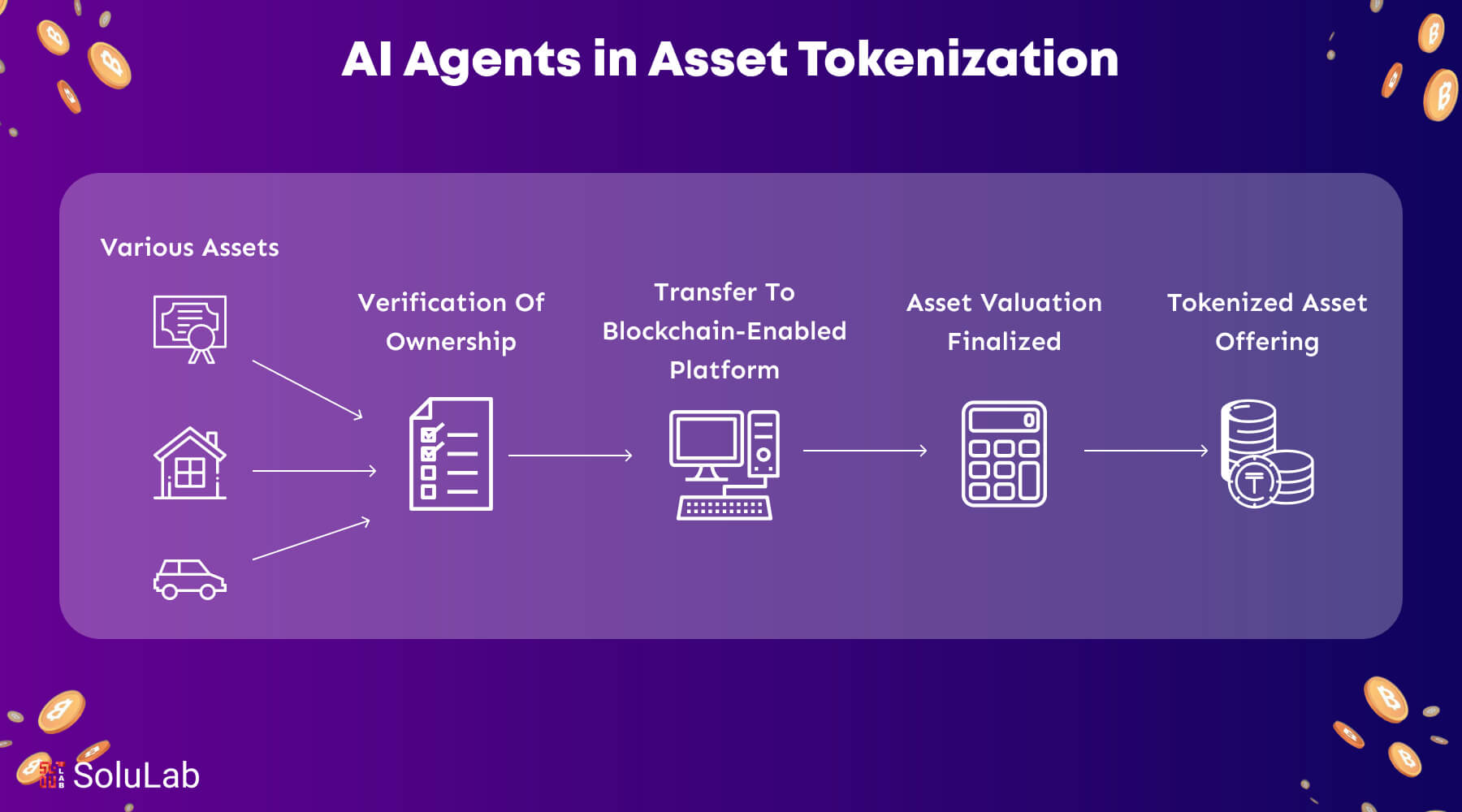
It is important to note that the tokenization of assets is not an exception to the fast-growing disruption that Artificial Intelligence (AI) is causing across so many industries of the economy. Due to the optimization of the procedures, strengthening the security, and development of new prospects for the tokenization of real-world assets, AI-based agents become more valuable tools. The introduction of artificial intelligence in asset tokenization is turning the storm all over the world.
The application of creation like AI and blockchain in tokenization changes the financial world as they create new opportunities for effectiveness, safety, and inventiveness. Just like artificial intelligence has created new ways of automation, data processing, and decision-making, so too tokenization offers us new ways of ownership and trade in assets. In tandem, they form an explosive mix that can remove the hurdles that are currently encountered by digital markets and unlock a new economy.
Further, we will look at the future trends of incorporating Artificial intelligence with tokenization in the hope of improving how these technologies may serve to advance the advancement of the marketing of digital asset ecosystems.
What are AI Agents?
A software application that can interact with surroundings, gather information,n and use that information to carry out autonomous actions and achieve present objectives is known as an AI agent. AI agents use cases autonomously to determine the optimal course of action to take for completing the goals that humans specify. Take for example, an AI contact center agent who wants to answer consumer questions, the consumer will automatically be asked where are queries by the agent who will then consult internal documents for information before providing a solution, and deciding whether it can answer the question on its own referred to a human based on the consumer answers.
They are made with an agent builder, such as an agent, or force, and use natural language processing (NLP) and machine learning to manage a variety of activities. These intelligent agents are capable of multitasking solving complicated problems and responding to basic inquiries. More significantly, self-learning allows AI agents to continuously and their performance. This is not as same as classical AI, which needs human input to perform certain jobs.
Understanding Asset Tokenization
The act of transforming real-world assets such as art commodities, intellectual property, and real estate into digital tokens that may be exchanged on Blockchain networks is referred to as asset tokenization. This approach offers a multitude of benefits which include decentralized exchange that makes it simple to trade tokenized assets which increases liquidity and reduces transaction cost Assets that are tokens can be easily exchanged on these exchanges.
Tokenization has made it possible for numerous investors to hold a piece of an asset, which creates the possibility of fractional ownership that intern makes high-value assets easily accessible to investors. Blockchain technology provides a safe transfer and method of tracking ownership and transferring assets which results in an enhanced level of security. The ability to program smart contracts allows for the automation of opportunities that involve royalty fees, voting rights, and dividend payments, which results in an increase in the efficiency of asset management.
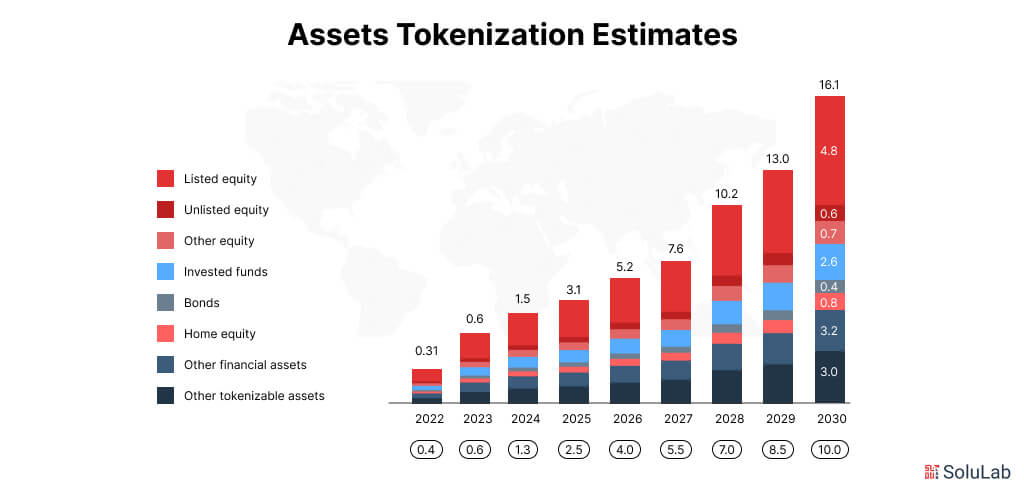
What is the Need for AI Agents in Asset Tokenization?
The landscape of asset tokenization is being changed by AI agents which are increasingly vital. A 2023 survey of 750 CFOs, at large organizations, found that 12% of real estate Enterprises employed tokenization. Tokenization uses smart contracts and blocks to create crypto assets from real assets. About 20% of respondents said that the company was earlier adopting the technology, while 26% were piloting it. These intelligence solutions are transforming the way these assets are traded, managed, and valued by improving security, guarantee, compliance, and simplifying processes. AI agents in asset tokenization are essential for the following reasons:
Transforming Asset Valuation
- Automated valuation models (AVMs): AI is an important instrument for precise valuation due to its capacity to process enormous information, such as asset records, market movements, and economic indicators. AI guarantees, fairness and transparency in tokenized transactions by automating the value of assets, including real estate.
- Predictive Analysis: AI predicts future market movements rather than merely responding to the data. AI focuses on price patterns by evaluating both historical and current data, giving investors the knowledge they need to make better decisions in a market that is changing quickly.
Automated Contracts
- Smart Contracts Creation: Asset tokenization using AI makes smart contract development quicker, more effective, and less prone to errors possible by humans. Automatic generation of predefined phrases speeds up the process of tokenization and lessons, and administrative workloads.
- Self-Executed Contracts: These agents are capable of independently monitoring and carrying out smart contracts, guaranteeing, smooth, timely fulfillment. AI makes sure everything runs well, whether it’s handling transaction fees or automating the payments of rent in real estate tokenization.
- Risk Assessment: By examining variables like geopolitical development and market, volatility, AI proactively, detects and evaluates hazards. AI assists investors in managing uncertainty and safeguarding their investments by offering risk insights.
Improving Security
AI-based asset management tokenization is a watchful guard that is always looking for all transaction patterns that can point to fraud. This is known as anomaly detection. AI preserves trust within tokenized assets and helps avoid expensive breaches by identifying questionable activity early.
- Real-Time Monitoring: AI keeps an eye out for security risks on Blockchain networks, guaranteeing a prompt reaction to any possible weaknesses. Token assets are safe and dependable because of this increased attention to detail.
- Biometric Authentication: AI-powered asset tokenization biometric technologies, such as fingerprint, scanning, and facial recognition, improve security in the field of asset tokenization by guaranteeing that only authorized users may access private information or assets.
Simplifying Compliance and Regulations
- Automated Compliance Checks: AI makes sure that companies remain compliant when tokenization requirements change. AI assesses businesses in staying ahead of the law and avoiding expensive fines by automatically verifying regulatory compliance.
- Timely Reporting: Compliance is a continuous process rather than a one-time event. AI can produce real-time reports, which lose the possibility of oversight by ensuring the organization state is current with requirements like AML/ KYC and tax standards.
- AI Chatbots: AI-powered chatbots provide 24 seven customer service, responding to inquiries on tokenized assets and helping investors as needed. This improves the client experience and increases consumer satisfaction.
- Individualized Suggestions: AI customized investment suggestions by examining investor preferences and historical performance, assisting people in making more knowledgeable and self-assured decisions regarding tokenized assets.
The role of AI in asset tokenization is very important and not merely a trend. The asset tokenization process is being changed by these intelligent solutions, which are also improving security, guarantee, compliance, streaming procedures, and offering individualized investor support.
Why Does AI Matter in Asset Tokenization?
Tokenization is undergoing a revolution because of artificial intelligence (AI) and NFT Marketplace Platforms which are also enhancing user experiences, building, strong ecosystems that benefit platforms and investors, alike, and upgrading infrastructure. The benefits of AI in asset tokenization are the foundation of a more effective and secure organized future, from front and personalization to back and optimization.
1. Backend Optimization
AI makes sure that the amount of data generated by tokenized assets is not squandered. AI solutions for asset tokenization improve important procedures like evaluation, algorithms, and pricing models by examining these data streams. Platforms can increase the accuracy of asset appraisal and spot new patterns across asset classes. Thanks to this data-driven approach. Platforms can use these data to adjust and improve their services over time, maintaining their competitiveness in a market that is changing quickly.
2. Expanding to Full Demand
Enormous amounts of transactions across platforms are being driven by the growing global interest in tokenization. AI in digital asset tokenization excels at handling these scalability issues. Platforms can manage significant growth without compromising performance with AI power solutions, which provide economic stability, high speed, processing, and effective resource allocation. AI guarantees seamless operations, even in situations with higher demand by automatic processes like distribution and transaction monitoring.
3. Enhanced Protection
As these tokenized assets are high value, securities are crucial. By tracking transactions to identify an address, fraud, or irregularities before they were, AI improves platform security. These clever algorithms are constantly alert, identify trends, and act quickly to Save Good user resources. This proactive strategy enhances the security tokenization platforms and fosters investor trust.
4. Front End
The way users engage organization platforms is being changed by AI agents. Imagine using well-known apps like Twitter or WhatsApp to access organized assets under the direction of knowledgeable agents. By responding to inquiries, offering tailored advice, and even carrying out the transaction, these agents make the intricate Ramla of tokenization as profitable as sending a straightforward message. For experienced participants, this degree of convenience increases involvement while lowering the entrance hurdle for new investors.
5. Smooth Investment Process
Through the use of image, recognition technology, blockchain tokenization with AI agents is also helping to close the gap between the digital and physical asset markets. After taking a picture of a tangible item, like a work of art or a piece of real estate, users can look for tokenized alternatives to invest in. By transforming regular interactions with physical Assets within digital investment opportunities, this technology creates new avenues for investors.
6. Investment Suggestions
In today’s financial environment, personalization is crucial, and AI meets this end. AI makes personalized investing suggestions for examining user preferences, actions, and portfolio histories. This makes investing more interesting and fulfilling by guaranteeing that each investor finds possibilities that are most pertinent to their objectives.
Real-World Use Cases of Asset Tokenization
Here we present actual instances of tokenized assets below:
-
Diamond Standard Tokenized Fund
To operate in the United States, Oasis Pro tokenized the Diamond Standard Fund (“Fund”) and floated it on the Oasis Pro Market, which is registered with the SEC’s ATS. Later, it broadened the Fund to the Asia market through the platform of InvestaX.
What’s the Fund About
The intangible Diamond Standard Commodities are what the Fund owns and stores physically, its real assets. The Fund allows experienced investors to invest in the first diamond commodity licensed by a regulator in the world with diamond as an asset class.
Type of fund: Alternative fund
Sponsors: Horizon Diamond Advisers, LLC and DSAM Advisors, LLC
Diamond commodities are a portfolio asset.
Bloomberg’s DIAMINDX is the benchmark index.
-
Mikro Kapital ALTERNATIVE eNoteTM Tokenized Bond
Mikro Kapital is the issuer that operates as a microfinancing company with targets aiding small and medium enterprises in the developing world. ALTERNATIVE, the digital security, and Corporate eNote provider fractionalizes business loans with Mikro Kapital issuing an ALTERNATIVE eNote™ Tokenized Offer to be listed on the regulated platforms of Obligate and InvestaX.
About the Tokenized eNoteTM
Fixed coupon, fixed maturity debt instruments linked to microfinance risks can be bought by professional investors and institutions from ALTERNATIVE – a securitization fund from Mikro Kapital. Thus, to ensure that micro-, small— and medium-sized businesses and entrepreneurs have access to financing services, the issuer takes on credit risks associated with the debt and equity of Microfinance firms, small financial institutions, leasing companies, banks, or credit cooperatives.
Mikro Kapital eNoteTM- ALTERNATIVE Bond tokenizations
The issuer Mikro Kapital is a microfinance-integrated company engaging in providing small-sized credits to independent businesses in developing countries. ALTERNATIVE eNote™ is an exclusive product of Mikro Kapital, which tokenizes its tokens and publicly offers them on regulated platforms of Obligate and InvestaX.
-
Methodic CoinDesk ETH
The Object of the methodic coindesk ETitle/ETH staking Fund is to deliver the entire return on Ethereum and ETH staking rewards. The issuer has also applied tokenization to enable the Fund to access a wider market of investors. Rewards that are received in Ether and are cashed in for currency or in-kind are given back by the Fund. The main token sale of InvestaX is held via the regulated platform.
-
Metavisio Corporate Bond
Metavisio SA which is an issuer of computer equipment that belongs to the entry category is a Euronext list company with a focus on the growth regions like India. The company has a brand name that has existed for 130 years and has support from established players in the market such as Microsoft, Google, NVIDIA, and others.
The Metavisio Corporate Bond was launched in March 2024. Through the funding, the company aims to expand its production facilities in India which will enable it to grow the company’s overseas business effectively. The Metavisio Corporate Bond is provided through the Singapore-regulated marketplace InvestaX.
Challenges Involved in Tokenization
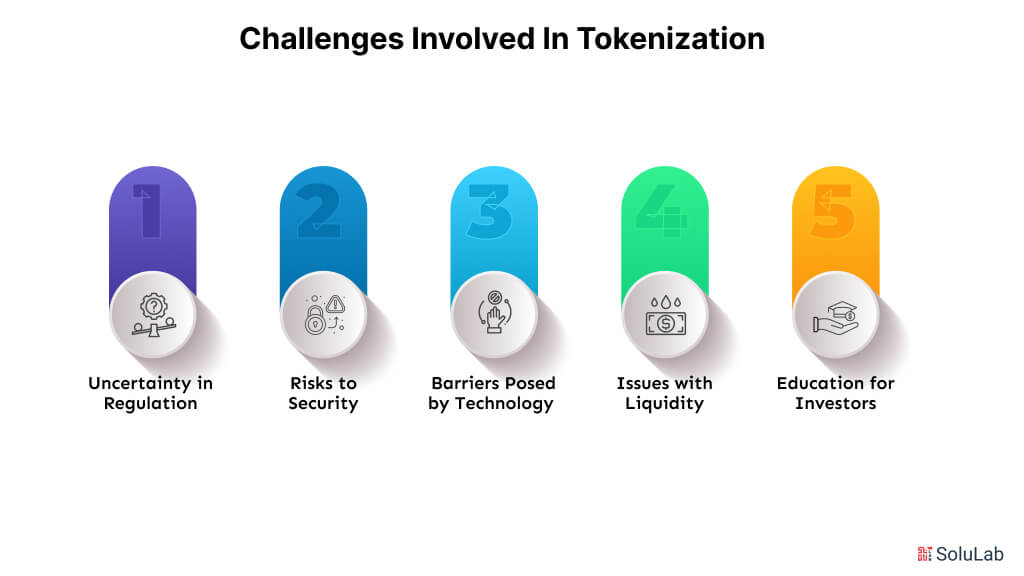
While tokenization is being widely applied to digitalization, trading, and management of assets, the number of challenges that have to be addressed to unlock the full potential of tokenization remains.
- Uncertainty in Regulation
This is easily achieved because there are no clear-cut legal frameworks within many organizations. Some compliance issues in international operating businesses stem from the difference in laws across countries and authorities regulating tokenized assets. The application of tokenization is generalized by the issues related to securities, KYC, and AML regulations.
- Risks to Security
And yet, even with the securities that blockchain provides, a tokenized asset is still vulnerable to such vices as phishing, fraud, and hacking. It can be a potential factor for investors to withdraw their confidence in the blockchain platform because cybercriminals could exploit bugs in smart contracts or vulnerabilities on the platform. Security measures are important to keep, yet they often prove moderately challenging to sustain.
- Barriers Posed by Technology
Tokenization-related infrastructure is still in a nascent stage, however, this is continuously evolving. The challenges may include, scalability issues, costly transactions, and limited compatibility of the blockchain network. Moreover, when it comes to implementation, it can take a long time to identify how tokenization platforms can connect with existing systems.
- Issues with Liquidity
For digitized assets, there must be active secondary markets to help them in their operation. With the right targeting, investors face a problem of low liquidity, which means that it is rather difficult for them to exchange their tokens or easily turn them into cash since many tokenized asset markets are rather illiquid.
- Education for Investors
Tokenization poses a high learning curve to both institutions and individuals in the investing business. Industry-wide tokenized asset adoption is still constrained because a lot of potential participants lack knowledge about or do not understand how they work.
Future of AI Agents in Tokenization of Assets
The role artificial intelligence plays occupies a prominent position in the tokenization of assets, and this role only grows as it evolves. An organization seems to hold a future of asset tokenization with AI decentralized autonomous organization (DAO) that can manage tokenized assets. This would make DAOs more efficient and give them self-sustainability or self-monitoring.
Organized assets will further remain safeguarded from cyber risk and attempts to hack the same by the security solution. AI-driven AI in the future shall humanize investment experiences that when applied encourage participation in the tokenized economy, this is true because AI makes it viable to token new forms of asset classes that have ever been employed. For instance, insurance policy royalties.
Can Partnering With SoluLab Help You With Using AI for Your Business?
To fully utilize the possibilities of real-world tokenization, artificial intelligence is essential. Platforms such as SoluLab can increase asset tokenization’s accessibility, effectiveness, and security by fusing the decentralized nature of blockchain technology with AI’s predictive and adaptive powers. When combined these technologies will create a more open global economy that will enable participation in the financial future for anyone anywhere. Asset tokenization has a promising future with AI.
Digital Quest, by SoluLab, an AI Agent development company, effectively changed its user experience and customer interaction strategy by collaborating with us, demonstrating the potential of artificial intelligence technology. In addition to offering precise, customized travel advice, that chatbot created a smooth feedback loop for ongoing development. Get in touch with SoluLab today and start your process of transformation.
FAQs
1. What is tokenization in AI?
In the field of AI, tokenization is the act of breaking up input text into smaller tokens like words or subwords which can be done by an asset tokenization development company. This lays the groundwork for tasks involving natural language processing (NLP), which allows AI to comprehend human language.
2. Is Alexa an AI Agent?
Amazon has big hopes for Alexa’s growth, Alexa will be able to carry out duties on her own if it is developed as an AI agent. That was clarified by CEO Andy Jassy, on a call regarding financial performance.
3. What is Asset Tokenization?
The process of using blockchain technology to transform the value of an intangible or tangible item into a digital token is known as asset tokenization. Fractional ownership, enhanced liquidity, and transparent traceability are all made possible by this change.
4. What is an example of tokenization?
Tokenization is the process of substituting a non-sensitive token for a sensitive data piece, like a bank account number. The token is considered to be a randomly generated data string with no inherent value or significance that can be exploited.
5. Can Solulab assist with tokenization services?
Yes, Solulab uses AI and Blockchain to streamline asset tokenization. We offer entirety tokenization solutions using our experience. We seamlessly integrate modern technologies from the tokenization framework conception for secure blockchain.




